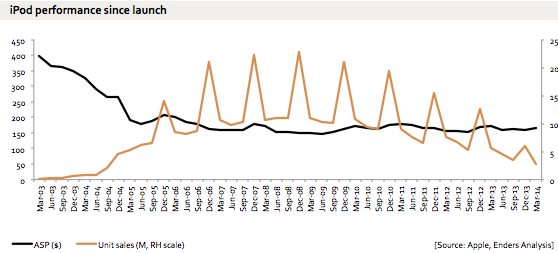Beats - content is king?
Apple's Beats deal is a Rorschach Blot: people's reactions slot into their existing view of whether Apple still has 'it'. If you think Apple's lost it, the Beats deal is confirmation. If you don't, it's… perplexing. This is a very out-of character move for Apple (though having everyone puzzled is in character). I've seen plenty of suggestions, but few really convincing rationales that make this company worth $3bn to Apple.
That said, one thing that is clear is that Apple doesn't rule digital music anymore. Streaming and YouTube ended that, along with smartphones. Instead of a library of tracks you’ve bought and paid for, locked to a single platform by proprietary DRM, you can now listen to any track you want on any device you want, and can switch between different music services with little friction. And the iPhone’s multi-touch screen itself broke the iPod’s monopoly on good user experience - now anyone can make a decent music player experience on any device, in code.
Hence, the iPod was a lovely business but it's now pretty much over. Apple has sold 392m iPods since launch (including something over 100m iPod Touches, though) for around $66.6bn, (plus of course the revenue from selling music, which is a more complex issue). There's not much more to come.
This reflects a broader change: content isn't king anymore.
Music has gone from being a key strategic lever in the tech industry to an afterthought. The same applies to movie and TV libraries - media has gone from being a choke-point to a check-box, commodity feature than every platform has to offer but where none has any particular advantage. Books have evolved slightly differently, but with Kindle on any device you might possibly want to read on, books are not a platform lock-in either (except possible for Amazon, but that remains to be seen). So for a platform owner or device maker, the content you can offer is no longer a strategic asset. Content doesn't sell devices, because they all have the same content.
In parallel, of course, the actual value of content - music in particular - is dwarfed by the value of the smartphone explosion. The iPhone alone generated $26bn in revenue last quarter - the entire recorded music industry brought in about $17bn in 2013, and the last three quarters of iPhone sales brought in more hardware revenue than the iPod in its entire history. And though 391m iPods have been sold since 2001, there are over 1.5bn smartphones on earth right now, and close to 300m are sold every quarter.
The amount of money involved, never that large in the context of the consumer technology industry, is such now a small percentage of Apple or Google's revenues that they might almost offer it at cost, just to have the feature. This was one reason why, before the iPhone even launched, Jeff Zucker, then CEO at NBCU, suggested that he should get a cut of iPod hardware revenue. He was mocked in the tech industry but was making a perfectly legitimate point: the money in digital video was in the devices, not the video. At that point the content he was putting on iTunes still gave Apple leverage - not anymore. This is what the people behind Beats Music may have caught on to - the money is in headphones, not the tracks they play.
The one remaining place where content is king, of course, is TV, at least in the key US market. If someone tells you they’re going to disrupt mobile, ask them ‘with what spectrum?’, and if they say they’re going to disrupt TV then ask ‘with what content?’ Here, again, there's no differentiation: every device has the same music, movies and books and doesn't have the same TV.
Hence, the one remaining place for Apple to work its magic is in the TV market. I wrote a post here talking about all the reasons why the US TV market in particular is rigid and also so brittle: there is still scope here for a technology company or other to put together a totally unique offer, with content as the key leverage point. But I'm not sure there's any such scope in music.


